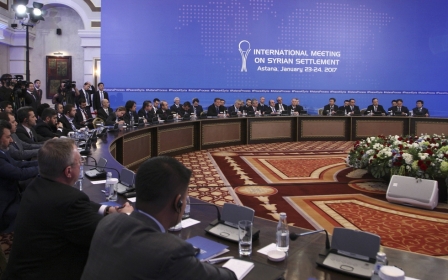US Pentagon confirms it used depleted uranium in Syria
The United States used depleted uranium anti-tank rounds in Syria on two occasions in 2015 amid devastating air strikes against convoys of Islamic State (IS) group tanker trucks, the Pentagon confirmed on Thursday.
Depleted uranium munitions have armour-piercing capabilities. They have been criticised for posing health risks to soldiers who fire them and to civilian populations. Some scientists and Iraqi physicians blame depleted uranium weapons used by US forces for a major increase in cancer cases and birth defects in Iraq.
The munitions are also suspected to be a possible cause of "Gulf War syndrome," a name given to a collection of debilitating illnesses suffered by veterans of the 1990-91 Gulf War.
“Given the international opprobrium associated with the use of depleted uranium, we had been pretty astonished to hear that it had been used in operations in Syria,” Doug Weir, the International Coordinator for the Coalition to Ban Uranium Weapons, told the Washington Post on Wednesday.
“The US consistently states that the weapons are for anti-armour use, although their record from Iraq…was further evidence that this doesn’t really bear close scrutiny.”
The United Nations Environment Program has described depleted uranium as a "chemically and radiologically toxic heavy metal".
A by-product of uranium enrichment, depleted uranium "is mildly radioactive, with about 60 percent of the activity of natural uranium," it says.
A military spokesman said A-10 attack aircraft used depleted uranium rounds on 16 and 22 November 2015 in attacks on tanker trucks carrying oil for IS.
The operations destroyed hundreds of trucks.
A total of 5,265 depleted uranium rounds were fired in combination with other incendiary rounds, US Central Command spokesman Major Josh Jacques said.
The combination of armour-penetrating and high explosive incendiary munitions was used "to ensure a higher probability of destruction of the truck fleet ISIS was using to transport its illicit oil," he said, using a different acronym for IS.
"We will continue to look at all options during operational planning to defeat ISIS, this includes DU rounds."
'Disturbing'
The UN Environment Programme has conducted studies and clean-ups of areas affected by use of the munitions in conflicts in the former Yugoslavia and Iraq.
Mozhgan Savabieasfahani, a researcher who has published several scholarly journals on the links between health issues and war pollution in Iraq, said depleted uranium damages DNA and creates mutations, which may cause birth defects and diseases in the offspring of people exposed to it.
Although the US military said it has only used DU twice only in 2015, Savabieasfahani said there is no telling that the Pentagon is not telling the whole truth.
“The credibility of the United States army is quite thin,” Savabieasfahan told Middle East Eye.
She said she finds the use of depleted uranium in war “disturbing”.
“It’s a very, very toxic material to be spreading around a civilian society, and it appears like they have been doing it,” Savabieasfahan said.
She added that even when DU is used against oil tankers in the desert, it remains for years in the environment without breaking into harmless compounds, and it can spread to populated areas.
New MEE newsletter: Jerusalem Dispatch
Sign up to get the latest insights and analysis on Israel-Palestine, alongside Turkey Unpacked and other MEE newsletters
Middle East Eye delivers independent and unrivalled coverage and analysis of the Middle East, North Africa and beyond. To learn more about republishing this content and the associated fees, please fill out this form. More about MEE can be found here.




